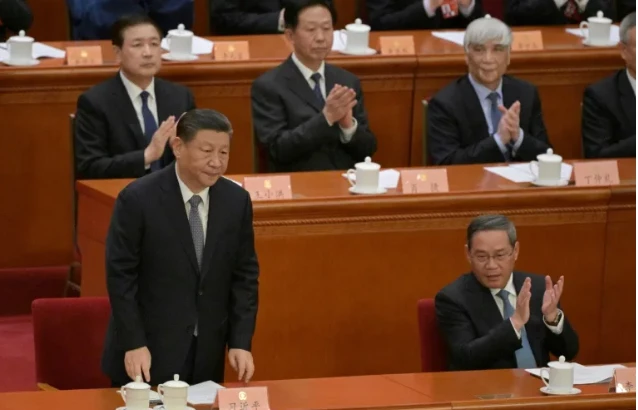China kicked off its largest political event of the year on Monday with large floral displays, sniffer dogs and red flags aplenty as Beijing put on a carefully choreographed display of national unity.
The country's "Two Sessions" -- parallel conclaves of its rubber-stamp parliament and a separate political advisory body -- are an annual spectacle that draws thousands of delegates from across China to the capital.
The atmosphere in Beijing on Monday, the opening of the Chinese People's Political Consultative Conference (CPPCC), was a mix of pomp and paranoia.
Large swathes of the city centre were closed off and traffic slowed to a crawl, with police standing guard at checkpoints along Chang'an Avenue, which runs past Tiananmen Square.
Security officers patrolled major streets with sniffer dogs, while elderly volunteers in red armbands monitored pedestrians for suspicious behaviour.
Train passengers travelling to the capital were subjected to additional security checks, with disembarking crowds squeezing through a metal detector and scrambling to shove suitcases onto an X-ray belt at Beijing South station on Sunday night.
But inside the palatial Great Hall of the People on Monday, the country's political elite were welcomed with red carpet and lush flower arrangements.
Immaculately coiffed attendants guarded rows of large baby-blue thermoses, waiting to serve the hot water that is a prerequisite at Chinese meetings.
Smiling attendees clapped in time to a festive march as President Xi Jinping entered the main conference hall for the CPPCC's opening ceremony.
"I've been really looking forward to this," said Yang Yuni, a delegate from southwestern Yunnan province, dressed in the elaborately embroidered traditional garb of the Hanni ethnic minority.
The two-time delegate told AFP she had been "extremely nervous" as a rookie last year, but was glad to see "familiar faces all around this year".
- Cheerful censorship -
Yang arrived in Beijing hoping to raise interest in the traditional agricultural customs of the Hanni people, and promote online sales of local products from her home region.
Unlike the National People's Congress, which begins its meeting on Tuesday, the CPPCC has no direct role in government policy but is often a stage for representatives to highlight local concerns and niche interests.
The conference "can reflect the wishes of the masses to the central (government), and better express the voice of the people," Su Haizhen, a delegate from southern Guangxi province, told AFP.
However, only voices that don't stray from Beijing's official narratives are welcome.
The Two Sessions usually coincide with a period of heightened censorship and political repression.
Administrators of Weibo, one of the country's most popular social media platforms, urged users on Monday to "create a good discourse atmosphere together".
"Let's use our wisdom and passion to contribute wisdom and strength to the glory and development of our country," the administrators exhorted cheerfully, in a statement that also described the deletion of user accounts that had "hyped up societal negativity".
Gao Yu, a Beijing-based independent journalist previously imprisoned for critical reporting about the ruling Communist Party, said on her X account last week that national security officers had been calling "sensitive individuals" in the city ahead of the meetings.
"Going into the Two Sessions period, life in Beijing gets really unbearable," she wrote.


